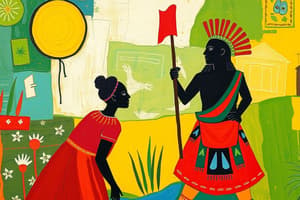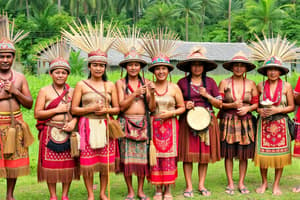Podcast
Questions and Answers
What do 'indigenous rights' refer to?
What do 'indigenous rights' refer to?
- Rights of dominant societies
- Rights of people who follow modernization efforts
- Rights of people who live in urban areas
- Rights of people who belong to ethnic groups with traditional territories and distinct ways of life (correct)
What did the colonization by Spain bring to the Philippines in terms of culture?
What did the colonization by Spain bring to the Philippines in terms of culture?
- Preservation of indigenous cultures
- Promotion of indigenous languages
- Imposition of Spanish laws, religion, and culture (correct)
- Respect for indigenous traditions
When did calls for self-determination and recognition of indigenous sovereignty emerge in the Philippines?
When did calls for self-determination and recognition of indigenous sovereignty emerge in the Philippines?
- After independence was attained
- During American occupation
- Early 1980s (correct)
- Late 16th century
What is the significance of maintaining 'Kasarinlan ng mga Katutubong Pilipino' in the Philippines?
What is the significance of maintaining 'Kasarinlan ng mga Katutubong Pilipino' in the Philippines?
How did the new government after independence treat indigenous concerns?
How did the new government after independence treat indigenous concerns?
Why is preserving the culture and traditions of the Philippines important?
Why is preserving the culture and traditions of the Philippines important?
How does respecting diverse cultural expressions contribute to strengthening national unity?
How does respecting diverse cultural expressions contribute to strengthening national unity?
What is the significance of land rights for indigenous communities?
What is the significance of land rights for indigenous communities?
Why is self-determination important for indigenous communities?
Why is self-determination important for indigenous communities?
What principle is recognized as fundamental before any project impacts indigenous territories?
What principle is recognized as fundamental before any project impacts indigenous territories?
Flashcards are hidden until you start studying
Study Notes
Maintaining Indigenous Rights of Filipinos
The term 'indigenous rights' refers to the rights of people who belong to ethnic groups with traditional territories and ways of life distinct from those of the dominant societies in which they live. In the context of the Philippines, maintaining the Kasarinlan ng mga Katutubong Pilipino encompasses protecting their cultural heritage and safeguarding their land rights. This article will delve into the history of indigenous rights in the Philippines, emphasizing the importance of respecting and preserving these rights for the wellbeing of both the indigenous communities and the country as a whole.
Historical Context
Indigenous peoples have inhabited what is now known as the Philippines for thousands of years. Their cultures, traditions, and lifestyles predate colonialism and modernization efforts. However, colonization by Spain in the late 16th century brought significant change to the archipelago, including the imposition of Spanish laws, religion, and culture, leading to the marginalization and oppression of indigenous peoples. After independence was attained through the Philippine Revolution and subsequent American occupation, the new government continued to ignore indigenous concerns. It wasn’t until the shift towards democracy in the early 1980s when calls for self-determination and recognition of indigenous sovereignty began to emerge.
Significance of Preserving Culture and Traditions
Kasaysayan ng kasarinlan ng Pilipina highlights the rich tapestry of customs and practices unique to each indigenous group across the country. These traditions not only constitute part of the national identity of the Philippines but also serve as important social bonds within local communities. By acknowledging and valuing this heritage, we can help preserve historical memory, promote intercultural understanding, and support sustainable development initiatives among indigenous populations.
Paganghalagang sa kultura ng Pilipinas is integral to fostering mutual appreciation between different ethnicities living together in one nation. Furthermore, respecting diverse cultural expressions contributes significantly to strengthening national unity, while rejecting assimilationist policies helps maintain harmonious relationships between various sectors of society.
Land Rights and Self-Determination
Land rights are essential components of indigenous sovereignty worldwide, and this concept applies equally to the situation in the Philippines where a sizeable percentage of indigenous lands remains under threat due to mining exploration projects, logging operations, agricultural expansion, and other forms of encroachment. Protests against such invasions often lead to clashes between communities and authorities, highlighting the urgent need to address these issues. Supporting indigenous claims over ancestral domains not only protects crucial environmental resources but also upholds human dignity, ensuring that traditionally exploited natural wealth benefits its original inhabitants rather than outside corporations.
Self-determination allows indigenous communities to participate actively in decision-making processes regarding matters directly affecting them. This right includes access to education, healthcare services, infrastructure development - all designed according to their needs and aspirations without being dictated by external forces. Such autonomy empowers indigenous individuals and families to make choices conducive to the maintenance of their traditional ways of life.
In conclusion, it stands to reason why today's global discourse recognizes the fundamental principle of free, prior, and informed consent (FPIC) before any project impacts indigenous territories. Fulfilling this requirement ensures meaningful participation and provides avenues for collective action when necessary. Therefore, promoting such principles becomes paramount if we wish to see justice served and progress achieved in our collective pursuit of equality, harmony, and peace among all sectors of Philippine society.
Studying That Suits You
Use AI to generate personalized quizzes and flashcards to suit your learning preferences.



